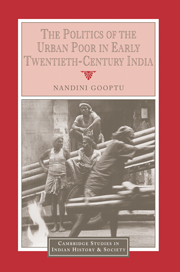Book contents
- Frontmatter
- Dedication
- Contents
- List of tables
- Acknowledgements
- List of abbreviations
- Select of glossary
- 1 The study and its perspectives
- Part I Changing contitions and experiences in interwar north India
- Part II Modes of political action and perception
- 5 Untouchable assertion
- 6 Militant Hinduism
- 7 Resurgent Islam
- 8 Nationalist action
- 9 Congress socialist mobilisation
- 10 The politics of exculsion and the ‘virtuous deprived’
- Bibliography
- Index
6 - Militant Hinduism
from Part II - Modes of political action and perception
Published online by Cambridge University Press: 05 July 2014
- Frontmatter
- Dedication
- Contents
- List of tables
- Acknowledgements
- List of abbreviations
- Select of glossary
- 1 The study and its perspectives
- Part I Changing contitions and experiences in interwar north India
- Part II Modes of political action and perception
- 5 Untouchable assertion
- 6 Militant Hinduism
- 7 Resurgent Islam
- 8 Nationalist action
- 9 Congress socialist mobilisation
- 10 The politics of exculsion and the ‘virtuous deprived’
- Bibliography
- Index
Summary
The major cities of UP in the interwar period emerged as the sites of unprecedentedly widespread and frequent communal violence between Hindus and Muslims. This outbreak of violence was accompanied by an increasingly militant and martial public expression of both Hinduism and Islam. Religious processions and festivals proliferated and came to be observed with mounting zeal and fervour. Such religious expressions were characterised by aggressive chants and displays of arms and physical feats. Religious organisations multiplied in urban neighbourhoods, with intensifying rivalry and competition between contending groups of Hindus and Muslims. Most significantly, in this upsurge of religious militancy, some sections of the urban poor came to play a pivotal role. This chapter and the following one seek to shed light on this history of religious resurgence and strife among various groups of the urban poor.
The subject of religion and politics has engaged much scholarly attention. When urbanisation, religious conflict and the poor are discussed, some dominant themes run through most studies in different ways. One theme is the segmentation of the labour market along the lines of caste or religious community, frequently reinforced by the divisive strategies of the employers and the state in recruiting, controlling, and reproducing labour. Competition among members of different communities for jobs is considered a significant factor in the formation and expression of religious identities.
- Type
- Chapter
- Information
- The Politics of the Urban Poor in Early Twentieth-Century India , pp. 185 - 243Publisher: Cambridge University PressPrint publication year: 2001

